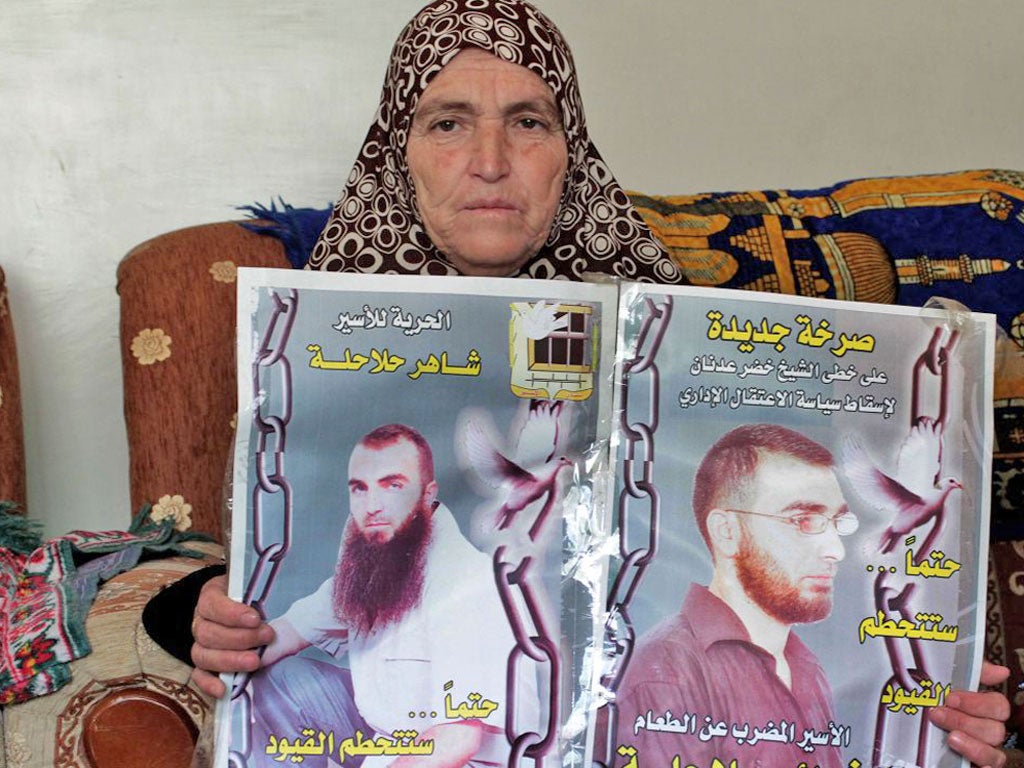Hunger strikers challenge Israel. But which side will blink first?
International outcry as Palestinians protesting against policy of detention without charge near death

In the message to his family, Tha'er Halahleh asks his wife for forgiveness. It might be the Palestinian's last words to her, for he is close to death after 74 days on hunger strike in an Israeli jail.
At his family home near Hebron, his mother, Fatmeh, holds a picture of her son in happier days. No longer the lean man in the photograph, he tells them that he is wasting away in a prison hospital bed. His weight has plunged by nearly 30 kilograms, he is bleeding internally, his teeth are falling out, and he is finding it difficult to hear.
A so-called administrative detainee, Mr Halahleh, 34, has been imprisoned for two years without charge, denied trial or permission to view the evidence compiled against him. Israel typically detains those it suspects of security-related offences or membership of militant organisations. Mr Halahleh and his fellow administrative detainee Bilal Diab, 27, who was seized last August and is also on hunger strike, now face what critics say is a "death sentence" after Israel's highest court rejected an appeal for their release last week.
As their conditions deteriorate, Israel is under growing international pressure to take steps to end the hunger strike. Some believe the swelling support for the strikers could trigger the Palestinians' own Arab Spring.
Responding to criticism that the United Nations has remained silent on the matter, Ban Ki Moon, the UN chief, condemned Israel's inaction, calling on it to charge the administrative detainees or release them "without delay".
Israel has defended its policy of detaining Palestinians without charge by saying that it cannot always reveal evidence against terror suspects without compromising its informants.
Nevertheless, Mr Halahleh's family was quietly optimistic yesterday in view of unconfirmed media reports suggesting that a decision to release the two men within weeks may be imminent.
Between 1,500 and 2,000 of the 4,700 Palestinian prisoners in Israeli jails have been on hunger strike since 17 April. They are demanding better conditions, including an end to solitary confinement, improved family visitation rights and access to education.
Palestinian sources suggested yesterday that Israel might cave in to those demands, but there was no confirmation of a deal for Mr Halahleh and Mr Diab, who Israel claims are both active members of the militant group Islamic Jihad and remain a threat.
"If this is a game of who blinks first, [Israel] is taking it to the limit," said Hadas Ziv from Physicians for Human Rights, an Israeli NGO monitoring the cases of the two men. The prisoners' situation bears gloomy parallels to the Irish Republican hunger strike in 1981. Ten died during the stand-off with the Thatcher government, the last after 73 days. Such was the international attention that more than 100,000 mourners attended the funeral of Bobby Sands, the most famous of the hunger strikers.
Israel faces a conundrum. If it releases the men, their struggle will provide inspiration to others, much like the recent release of Khader Adnan and Hana Shalabi after 66 days and 43 days, respectively, without food. But if one or both die, some fear their deaths could fan the flames of Palestinian resistance and trigger widespread unrest in the occupied West Bank. "We don't want to see anybody die," said Mark Regev, an Israeli government spokesman. "[But] you cannot have a situation where every prisoner who goes on hunger strike gets a 'get-out-of-jail-free' card. The criminal justice system would fall apart."
Mr Halahleh seems to accept he may not win this fight. In his letter to his wife, Shireen, dated 8 May, he writes: "I cannot describe with words my love for you. I am doing this for the sake of God and my homeland, for [you] and my daughter Namar. Take care of her and take care of your health... and forgive me."
Arrested two weeks before Namar was born, he has held his infant daughter for only five minutes, as family visits are conducted via telephone in separate rooms. Israel has tried to persuade his family to convince Mr Halahleh to give up the struggle, but to no avail. His mother says: "I will not put pressure on my son to make him yield. His dignity is more important than everything."
Desperate for justice: High-profile protesters
Yulia Tymoshenko
The former Ukrainian prime minister had until this week refused food to draw attention to her maltreatment in prison, where she says she is serving a politically motivated sentence. Ms Tymoshenko ended her almost three-week hunger strike, after Ukraine – under global pressure – met her demand to be moved to a hospital for medical treatment. EU officials and some governments have said they will boycott the European Championship football tournament in June, co-hosted by Ukraine and Poland, over her case.
Irom Sharmila
Nicknamed the "Iron Lady of Manipur", Ms Sharmila has been "nil by mouth" since November 2000 in protest against India's Armed Forces Special Powers Act, which allows the military special powers in the way it combats radicals and separatists. Force-feeding, through a tube in her nose, has kept her alive.
Anna Hazare
The acclaimed social activist's hunger strike in April last year ended days after it began when the Indian government agreed to his demand, and vowed to set up an anti-corruption ombudsman.
Abdulhadi al-Khawaja
The Bahraini rights activist became the face of anti-regime protests ahead of last month's Formula One Grand Prix in the Gulf kingdom. His ongoing refusal of food casts light over his imprisonment and that of 20 others accused of attempting to overthrow the regime during pro-democracy protests last year. There is speculation that Mr al-Khawaja has been force-fed.
Join our commenting forum
Join thought-provoking conversations, follow other Independent readers and see their replies
Comments
Bookmark popover
Removed from bookmarks